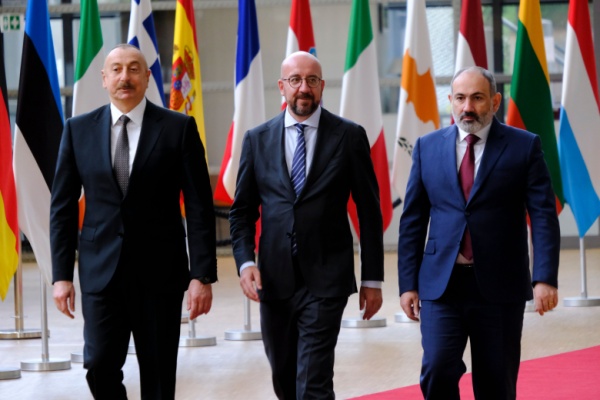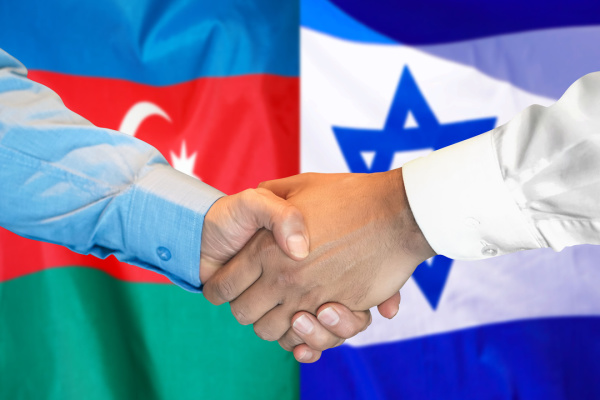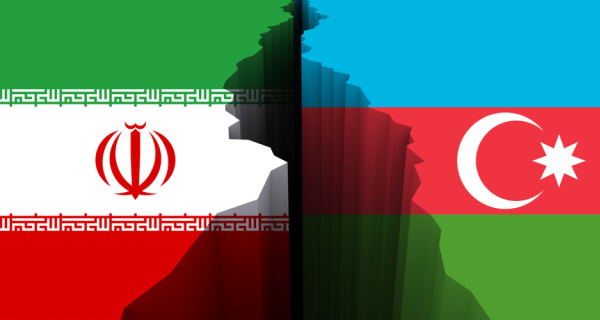Azerbaijan Pushes Ahead With Its Balancing Strategy
By Emil Avdaliani
On October 9, the presidents of Russia and Azerbaijan met in Dushanbe. Relations appear to be improving and despite the persisting distrust, Baku seeks to maintain a functional relationship with Moscow. At the same time, Baku has taken significant steps to strengthen ties with Washington, with U.S. companies pledging investments in Azerbaijan’s oil and gas sector. Close relations with both Russia and the U.S. align with Baku’s commitment to a balanced foreign policy aimed at avoiding dependence on any single major power. Through this approach, Baku seeks to demonstrate that it enjoys increasing flexibility in its international maneuvering.
Credit: Wikimedia Commons
BACKGROUND: Over the past two months, Azerbaijan’s relations with both Russia and the U.S. have undergone significant changes, reflecting Baku’s continued commitment to maintaining balance in its foreign policy.
On October 9, Vladimir Putin met with Azerbaijani President Ilham Aliyev in Dushanbe, Tajikistan. During the meeting, Putin addressed what he called the “most sensitive issue,” the December 2024 crash of an Azerbaijan Airlines Embraer 190 jet, caused by a Russian air defense missile. He expressed his condolences and effectively issued an apology. Putin stated that the investigation into the crash had concluded and that the causes of the tragedy had been identified. He attributed the incident to three Ukrainian drones allegedly flying over Russian territory at the time and mentioned technical malfunctions in Russia’s air defense system, which launched two missiles that did not directly strike the plane but exploded about ten meters away.
Between the downing of the Azerbaijani airliner and the meeting in Dushanbe, relations grew even more strained following the arrest of members of the Azerbaijani diaspora in Yekaterinburg in June 2025. Russian security forces detained a group of Azerbaijani nationals in connection with murders committed in the early 2000s, resulting in the deaths of two suspects during the operation. In response, Azerbaijan took retaliatory measures, arresting eight Russian citizens on charges of drug trafficking and cybercrime. The Russian House in Baku was subsequently closed, all Russia-related cultural events were cancelled, and Azerbaijani authorities detained both the director and the editor-in-chief of Sputnik Azerbaijan.
Amid the tensions and eventual reconciliation with Russia, Baku has also improved its relations with the U.S., which had deteriorated during the Biden administration. That period coincided with the fall of the Nagorno-Karabakh enclave and the mass displacement of Armenians, developments that created friction between Washington and Baku. However, with Trump’s return to the presidency, momentum began to build toward reversing this trend. The ongoing peace talks between Armenia and Azerbaijan drew renewed U.S. attention, with Washington showing a clear willingness to act as the main mediator in the process.
This development led to the peace summit in Washington, D.C., on August 8, where Yerevan and Baku reached a landmark agreement granting the U.S. a 99-year mandate to oversee the creation and operation of a transit corridor through Armenian territory. Named the “Trump Route for International Peace and Prosperity” (TRIPP), the corridor will connect Turkey with the Caspian Sea, bypassing the traditional route through Georgia. In addition, Azerbaijan secured U.S. President Donald Trump’s approval of an order lifting Section 907 of the 1992 Freedom Support Act, which had prohibited U.S. military assistance to Azerbaijan since the first Nagorno-Karabakh war. During the summit, Azerbaijan’s SOCAR signed a memorandum of understanding with ExxonMobil, and following the event, Washington and Baku agreed to hold regular meetings on military and economic cooperation.
IMPLICATIONS: For Azerbaijan, Putin’s remarks were seen as an apology, and Baku now appears ready to normalize relations with Moscow. Yet beneath this adjustment lies a deeper motive: Azerbaijan’s foreign policy is shaped by calculations of power balance. Although weakened by the war in Ukraine, Russia remains strong enough to exert pressure on Azerbaijan, and Baku has been cautious not to provoke Moscow’s anger. Positioned geographically between Russia and Iran, Azerbaijan remains vulnerable to possible Russian military or economic pressure, as well as to instability from the Middle East driven by Israeli and U.S. actions against the Islamic Republic.
This explains why, after a relatively extended period of tension with Moscow, Baku ultimately chose reconciliation. Moreover, this approach aligns with Azerbaijan’s broader pattern of behavior toward other powers. Since 2020, when Azerbaijan achieved a decisive victory in the second Nagorno-Karabakh war, its relations with Iran have worsened. Tehran grew concerned about the shifting balance of power in the South Caucasus, marked by Azerbaijan’s rising confidence and Turkey’s expanding influence. Until late 2024, ties between Baku and Tehran went through several cycles of tension, yet both sides were careful to prevent any major military escalation. This period concluded with a clear rapprochement between Azerbaijan and Iran, marked by bilateral visits and the reopening of the Azerbaijani embassy in Tehran.
The reconciliation with Moscow also reflects Baku’s ongoing focus on maintaining balanced relations with its neighbors, particularly major powers. Ties with Russia remain important, as shown by the expansion of the International North–South Transport Corridor (INSTC), which runs from Russia’s interior through Iran to the Indian Ocean. A key branch of this corridor passes through Azerbaijan, making it a vital route for Russia’s access to the Middle East. In addition, strong bilateral trade between Azerbaijan and Russia provides another incentive for both countries to avoid any serious deterioration in their relationship.
However, this reconciliation is neither complete nor entirely sincere. Azerbaijan will continue to follow its multi-vector foreign policy, which increasingly limits its dependence on Russia. The broader geopolitical context favors Baku. Engaged in a prolonged conflict that demands vast economic and military resources, Russia has been unable to maintain the dominant position in the South Caucasus that it held before 2022. The regional states, Armenia, Azerbaijan, and Georgia, quickly moved to take advantage of this new flexibility. Azerbaijan regained territories long controlled by Armenia, while Russian peacekeepers in Nagorno-Karabakh largely stood by. Since the fall of the Armenian enclave in September 2023, Azerbaijan’s relations with Russia have steadily worsened. In Baku, the need to rely on Moscow’s goodwill has greatly diminished, giving the country greater confidence in its foreign policy. As a result, Azerbaijan has expanded ties with Israel and Pakistan, improved relations with Iran, strengthened strategic cooperation with Central Asian countries such as Uzbekistan and Kazakhstan, and, most notably, established a strategic partnership agreement with China.
To balance Russia, Azerbaijan needs not only Turkey, its traditional ally, and stable relations with Iran, but also strong ties with the U.S. Although Washington has at times encouraged dialogue with Moscow over the war in Ukraine, it has also demonstrated its ability to pursue an independent agenda in the South Caucasus, often at odds with Russia’s core interests. The TRIPP agreement is one example of this approach. It angered Moscow because the deal reduced Russian influence and encouraged both Azerbaijan and Armenia to follow Washington’s lead. For Baku, therefore, greater U.S. involvement in the region translates into reduced dependence on Moscow.
CONCLUSIONS: The current level of tension with Russia has eased, following a familiar pattern in Azerbaijan’s dealings with Moscow and other neighboring states. It also shows that Russia cannot afford to abandon Azerbaijan or enter a cycle of escalation with Baku. Moscow is unable to handle another major crisis along its borders and remains dependent on Azerbaijan for transit within the INSTC project. Looking ahead, a continued period of stable but cautious bilateral relations is likely, without major escalation, yet unlikely to develop into deeper cooperation. The relationship will remain based on pragmatic, transactional engagement, while over time the geopolitical gap between the two countries can be expected to grow increasingly evident.
AUTHOR’S BIO: Emil Avdaliani is a research fellow at the Turan Research Center and a professor of international relations at the European University in Tbilisi, Georgia. His research focuses on the history of the Silk Roads and the interests of great powers in the Middle East and the Caucasus.
Azerbaijan's Whirlwind Months of Diplomacy Highlight Its Growing Importance
By Emil Avdaliani
Azerbaijan, akin to nations in Central Asia and the Gulf, endeavors to balance relations among major powers in order to avoid exclusive alignment with any singular geopolitical axis. Baku’s recent diplomatic initiatives reflect this strategy, which has contributed to enhancing the nation’s regional standing: relations with Iran have improved, engagement with China has intensified, and the European Union now seeks deeper political cooperation with Baku.

BACKGROUND: Ever since the return of Nagorno-Karabakh to Azerbaijan in 2023 the country has pursued a much more diversified foreign policy by simultaneously building closer ties, beyond what it already had with Turkey and Russia, with China, Iran, the EU, the Persian Gulf countries, Pakistan, Israel and has moved to improve relations with the United States, which suffered during the Biden administration due to the latter’s emphasis on human rights and democracy building issues.
Since the reintegration of Nagorno-Karabakh into Azerbaijan in 2023, the country has adopted a markedly more diversified foreign policy, strengthening existing ties with Turkey and Russia while simultaneously deepening relations with China, Iran, the EU, the Persian Gulf states, Pakistan, and Israel, and taking steps to improve strained relations with the U.S., which had deteriorated under the Biden administration due to its prioritization of human rights and democratic governance.
This dynamic has become particularly pronounced in recent months. In April, Iranian President Masoud Pezeshkian visited Baku to engage in discussions aimed at enhancing bilateral relations. Similarly, in April, the EU’s foreign policy chief, Kaja Kallas, visited Baku, where she met with President Ilham Aliyev and Foreign Minister Jeyhun Bayramov; during the visit, both parties agreed to resume negotiations on a new partnership and cooperation agreement.
A significant shift occurred in Baku–Beijing relations when, in April, the two countries elevated their ties to the level of a comprehensive partnership during the Azerbaijani president’s visit to China. While the development of the Middle Corridor remains a priority, the agreement with Azerbaijan places additional emphasis on enhancing bilateral cooperation in investment and business. As the largest economy in the South Caucasus, Azerbaijan serves as a key entry point for China into the region.
Similarly, in April and May, Azerbaijan conducted meetings with Ukrainian officials—an uncommon move given Baku’s cautious stance on the war. However, in the context of increasingly strained relations with Russia, Baku’s outreach to Kyiv appears intended to signal displeasure to Moscow. Russia continues to deny any involvement in the downing of an Azerbaijani aircraft over its territory, a claim Baku maintains. Consequently, relations have deteriorated, with President Ilham Aliyev declining to attend the Victory Day celebrations in Moscow in May.
In May, Uzbekistan and Azerbaijan formalized their strategic partnership, enabling Tashkent to become a party to the Shusha Declaration, originally signed between Turkey and Azerbaijan in 2021. Azerbaijan has maintained an active diplomatic presence in Central Asia, and although the Caspian Sea functions as a geographic divider, the South Caucasus and Central Asia are increasingly interconnected.
In late May, Azerbaijan hosted a trilateral summit with the leaders of Turkey and Pakistan, marking a new chapter in their cooperative relations. The geopolitical dimension of this partnership is becoming increasingly significant, particularly in light of Pakistan–India tensions and New Delhi’s growing ties with Armenia. The three Islamic nations also advanced collaboration in the political, economic, and military spheres.
Azerbaijan has also recently emerged as a venue for negotiations between opposing parties. For example, in April, Turkish and Israeli delegations convened in Baku to discuss the establishment of a potential “deconfliction mechanism” aimed at preventing direct clashes between the two states in Syria. In May, Baku also hosted Russian and German political representatives for talks on reviving the “Petersburg Dialogue,” which had been suspended since Russia’s invasion of Ukraine. This dimension of Azerbaijan’s diplomacy is particularly noteworthy, underscoring the country’s growing reputation as a credible and impartial facilitator of dialogue between the conflicting sides.
IMPLICATIONS: This diplomatic activism underscores Azerbaijan’s rising regional significance and its strategic efforts to position itself as a capable middle power—one that can exert influence within its immediate neighborhood while simultaneously acting as a crucial partner to rival great powers.
Evolving patterns of connectivity across Eurasia have been a key factor in enhancing Azerbaijan’s regional role. The Middle Corridor, which extends from the Black Sea to Central Asia and effectively links the EU with China, traverses Azerbaijan (alongside Georgia). This route enables both the EU and China to circumvent Russian territory, while Azerbaijan’s significance is further elevated by the EU’s demand for Caspian gas. Additionally, Brussels has intensified outreach to Central Asia, with which European leaders are increasingly engaging in trade and investment. The recent EU–Central Asia summit, where the Union pledged €12 billion in investments, exemplifies the rising importance of the Middle Corridor. A portion of this investment is earmarked for infrastructure upgrades along the route, particularly in Azerbaijan.
Azerbaijan has also assumed a more critical role for China than in previous years. From Beijing’s perspective, Azerbaijan functions as a gateway to the Black Sea region. Moreover, China views Azerbaijan as a promising market for its rapidly expanding electric vehicle (EV) industry. Data from the past year indicate that Chinese brands are gaining increasing popularity in Azerbaijan, with discussions underway regarding potential joint production ventures. The country may also serve as a strategic hub for the distribution of Chinese EV models throughout the South Caucasus and beyond.
Azerbaijan’s increasing regional significance has prompted Iran to pursue full normalization of relations with its northern neighbor. During the Iranian president’s visit to Baku, Azerbaijani President Ilham Aliyev declared, “Our goal, our primary goal is to raise Azerbaijani–Iranian interstate relations to a higher level.” This aspiration was accompanied by tangible measures. On May 21, Iran announced the execution of the sole assailant responsible for the 2023 attack on the Azerbaijani embassy. Additionally, Iran and Azerbaijan conducted joint military exercises—Araz-2025. Diplomatic relations have now been fully restored, and cooperation on the International North–South Transport Corridor has been expanded. Consequently, Tehran and Baku have reduced tensions to levels seen prior to 2020, before the Nagorno-Karabakh conflict.
Iran’s strategic calculations also reflect concerns about preventing Azerbaijan from decisively aligning with Israel or the U.S. Azerbaijan has recently been identified as a prospective candidate for inclusion in the Abraham Accords, a U.S.-led initiative aimed at improving Israel’s relations with the Islamic world. The U.S. Special Envoy for the Middle East, Steve Witkoff, indicated that Azerbaijan could join the Accords in the near future. While he mentioned other potential members—including Armenia, Syria, and Lebanon—Azerbaijan stands out due to its geographic location north of Iran. Although Baku and Tel Aviv have historically maintained close ties, formal accession to the Accords would significantly elevate Azerbaijan’s stature in the Middle East and strengthen its relationship with the U.S. Given the persistent challenge posed by Iran’s nuclear program, the Islamic Republic will remain a central focus of U.S. foreign policy for the foreseeable future. Accordingly, Azerbaijan’s position north of Iran will only enhance its strategic relevance for both the U.S. and Israel. This development will, in turn, improve Baku’s bargaining leverage, thereby motivating Iran to pursue increasingly cordial relations with its northern neighbor.
Another factor driving normalization is the Islamic Republic’s growing interest in maintaining peaceful relations with Azerbaijan, particularly as it faces mounting challenges. These include sustained Israeli strikes against its Axis of Resistance, the continued impact of the U.S. maximum pressure campaign, and tensions with Turkey arising from the evolving balance of power in Syria. In this context, Tehran appears increasingly inclined to avoid additional regional friction. Indeed, it may ultimately be compelled to tolerate Azerbaijan’s potential accession to the Abraham Accords, provided such a development does not constitute a direct security threat to the Islamic Republic.
CONCLUSIONS: The recent flurry of diplomatic activity surrounding Azerbaijan underscores the country’s rising significance in regional affairs. Transit, trade, and investment constitute the central pillars of Baku’s engagement with regional and global powers. This approach aligns with what is commonly termed a multi-vector foreign policy—a strategic orientation wherein no single major power is prioritized. Instead, multi-alignment is pursued as a means to enhance a country’s international standing. In a global context marked by great power rivalry, the erosion of international norms, and the ascendance of middle powers, Azerbaijan—like many states in Central Asia and the Middle East—seeks to balance among dominant actors to avoid exclusive alignment with any one geopolitical center. Thus far, this strategy has served Baku well, and it is likely to persist amid the continuing emergence of an increasingly multipolar international system.
AUTHOR’S BIO: Emil Avdaliani is Professor of International Relations at the European University in Tbilisi, Georgia, and a scholar of the Silk Roads. He can be reached on Twitter/X at @emilavdaliani.
Armenia and Azerbaijan: The Distant Perspective of Peace, Cooperation and Narratives of Trust
By Intigam Mamedov
March 21, 2024
On February 13, 2024, a new border skirmish took place between Armenia and Azerbaijan, months after Baku regained its territories in Nagorno-Karabakh. While the sides accuse each other of provocations, such incidents could also lead to larger clashes. While a peace deal is needed in order to put an end to the decades-long conflict, reaching an agreement will take time. Meanwhile, to encourage it, both states should now focus on trust-building initiatives, particularly in the humanitarian, economic, and environmental areas. Such short-term initiatives have the potential to assist and stimulate the evolution of new narratives on peaceful coexistence – a challenging but vital task for current and future generations.

Deepening Azerbaijani-Israeli Cooperation Contributes to South Caucasus Stability
By Robert M. Cutler
May 23, 2023
In mid-April, days before Azerbaijan opened its embassy in Tel Aviv, Israeli foreign minister Eli Cohen visited Baku to discuss regional security and Israeli diplomacy in Central Asia with President Ilham Aliyev and other senior officials. Israel’s deepening relations with Azerbaijan and the Central Asian countries—and the significant assistance that it can provide to these countries’ domestic economies as well as their security—contributes to the stability and security of the broader region in the face of Iranian bellicosity. They also give the Central Asian countries another “vector” for escaping the visegrip of Russian and Chinese influence.

President Aliyev: “Relations between Azerbaijan and Iran are at the Lowest Level Ever”
By Brenda Shaffer
May 8, 2023
From day one of the independence of the Republic of Azerbaijan, Iran has been hostile toward Baku and consistently acted to undermine its security and independence. However, over the last year the ties between the two bordering countries have deteriorated to an unprecedented level, with Azerbaijan’s President Ilham Aliyev describing relations between Azerbaijan and Iran as “at the lowest level ever.” President Aliyev in a recent meeting with researchers laid out the factors that have led to this downturn. President Aliyev stated that in Iran, “terror is organized on a governmental level.”




